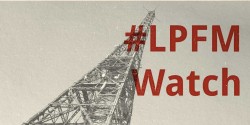It’s fascinating to learn more about the roots of low power FM and earlier this week, Brian Fauteux published his interview with author Christina Dunbar-Hester, whose book, Low Power to the People: Pirates, Protest, and Politics in FM Radio Activism, looks into the history of low power radio. Dunbar-Hester recounts the important role that activists and microradio advocates played in allowing for the development of LPFM, saying,
It’s obviously impossible to know how many of them there were, but there may have been around 1000 microradio stations in the mid-1990s. Two people with memorable stories, who were inspirational to other microradio broadcasters, were Mbanna Kantako in Springfield, IL in the late 1980s, and Stephen Dunifer in Berkeley, CA, in the 1990s. Dunifer had a high-profile court battle with the FCC when he refused to stop broadcasting, and the 9th Circuit upheld his right to continue for a time. The members of Prometheus Radio Project in Philadelphia, who are the subject of my book, were inspired by the microbroadcasters to fight for legal access to the airwaves.”
Choosing Podcasting and Low Power AM Over LPFM
On the Radio Survivor Podcast this week, there’s an interesting interview with the folks behind Bainbridge Community Broadcasting. The group applied for a LPFM license under the sponsorship of another non-profit, but after closer inspection, they realized that LPFM may not be the best option for them due to the geography of Bainbridge Island. After withdrawing its application, the group decided to pursue municipal low power AM and podcasting instead. Listen to the interview starting at around the 24 minute mark to hear more about why they passed up on LPFM and what their specific plans are for low power AM broadcasting (which is available through its city-run emergency channel) and podcasting.
Petition for Rule Making Requests Changes to LPFM Service
Not everyone in the LPFM community has the same philosophy about the role that LPFM stations should play in the broader radio landscape. It’s not surprising, as LPFM stations are wildly diverse, with a variety of missions and audiences. We’ve seen some proposals coming through the FCC, arguing for various changes to the LPFM service.
Radio World reports on Low Power FM Advocacy Group Executive Director Dave Solomon’s proposal (submitted to the FCC this week) to “reclassify low-power FM as a primary service, give a power increase, allow licenses to be sold at profit under certain circumstances and implement other regulatory changes.” Additionally, the proposal calls for LPFM stations to be able to increase power to 250 watts, be sold for a profit after three years, and be allowed to air commercials. In a response on REC Networks, Michelle Bradley writes, “As demonstrated over the past few months on social media, the LPFM.AG petition has struck some chords both within the LPFM community as well as the full-power community especially over the ability for LPFM stations to air commercials. REC hopes that we can have a civil discussion on the issues now that they are in the open. We need to be open to all ideas and allow them to have their due process.”
More Construction Permits Issued, While Some are Due to Expire
In low power FM (LPFM) news this week, we see another construction permit granted, this time to Iglesia Sanando Las Heridas in Renton, Washington. As we mentioned last week, the initial round of LPFM construction permits (issued in January, 2014) are beginning to expire, so it’s important for permit holders to either get on the air or request an extension from the FCC. See the expiring construction permits list compiled by REC Networks to ensure that your paperwork is in order.
Former Pirate Denied Request for LPFM
Folks who have engaged in unlawful unlicensed broadcasting are precluded from being able to run LPFM stations. In a way it’s a shame, as some former pirates would actually be good stewards of new non-commercial radio stations, and as we mentioned above, some pirate radio broadcasters were actually strong advocates for the development of a legal low power FM service.
We first reported in March that an applicant in Pinellas Florida, WKMJ Radio Live the People station, had its LPFM application dismissed because the FCC “…found that Kervenson Joseph, the chief executive officer and a board member of WKMJ, had previously engaged in the unlicensed operation of a radio station…”
Following that dismissal, the group filed a Petition for Reconsideration, citing alleged procedural errors. In denying the Petition for Reconsideration, the FCC writes, “…the Commission’s own records confirm that Joseph engaged in unlicensed operation of a radio station. On December 19, 2013, the Commission’s Enforcement Bureau served a Notice of Unlicensed Operation on Joseph.”
LPFM Watch is a weekly feature on Radio Survivor appearing every Thursday.



